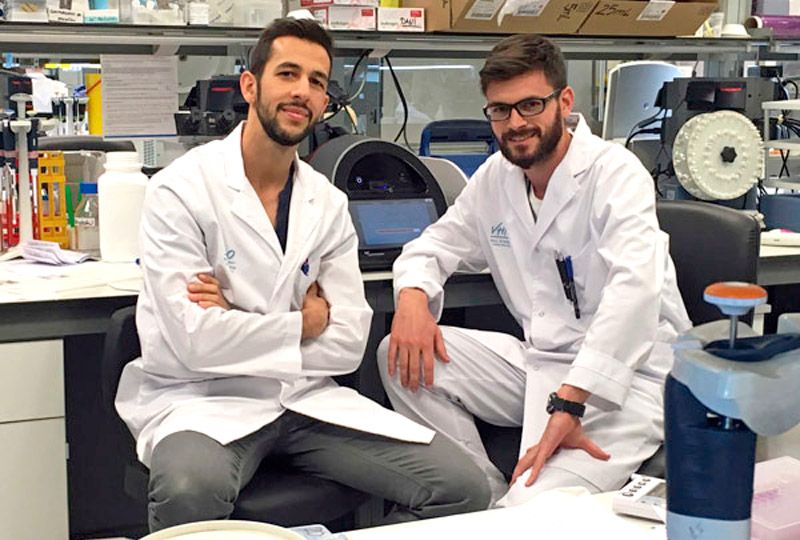

Discovered over three decades ago, mutant RAS oncogenes are implicated in around 30% of human cancers, and KRAS is its most potent and prominent member. In Non-Small Cell Lung Cancer (NSCLC), the main lung cancer subtype responsible for the highest number of cancer-related deaths, KRAS is mutated in just under a third of cases, and 90% of Pancreatic Ductal Adenocarcinoma (PDAC) harbor KRAS mutations.
Given the high prevalence of these tumor types and generally poor prognosis, extensive research has centered on better tackling tumors driven by – and dependent on – this frequently mutated cancer gene. Despite such determined efforts, the development of targeted therapies to more effectively counteract KRAS-driven malignancies and slam the brakes on their runaway growth represents an unresolved challenge.
One potential contender in the race to improve outcomes for patients harboring the KRAS mutated cancer gene is the Bromodomain and Extra-Terminal domain (BET) family of proteins that are increasingly showing promise as targets in oncology. Novel BET inhibitor, BAY 1238097, has displayed anti-tumor activity in a number of models both in vitro and in vivo, inhibiting the growth of solid tumors including melanoma and lung cancer.
Seizing on this potential therapeutic window, an open access article published today in Oncotarget*, first co-authored by Toni Jauset, formerly a graduate student of VHIO’s Mouse Models of Cancer Therapies Group and now researcher at VHIO-born spin-off Peptomyc S.L. (both directed by Laura Soucek ), and Daniel Massó Vallés, Post-Doctoral Fellow of the same group, preclinically evidences the effect of this new BET inhibitor against PDAC and NSCLC in genetic mouse models harboring RAS mutations in vivo and in vitro.
Toni and his co-collaborators from VHIO’s Mouse Models of Cancer Therapies Group, Peptomyc, as well as colleagues from Kitos Biotech (Alghero, Italy), University of Sassari (Sassari, Italy), Institute for Research German Trias i Pujol (Barcelona) and Bayer AG (Berlin, Germany), have evidenced a significant therapeutic impact of BET inhibition by BAY 1238097 against NSCLC and PDAC in vivo. Findings show important tumor reduction in genetic mouse models of KRAS-driven tumors as well as efficacy in vitro in RAS-mutated NSCLC and PDAC human cell lines.
Some studies also show BET inhibition as a potential strategy to inhibit the MYC oncogene which is found deregulated in most, if not all tumor types, and a major driver of tumor progression and maintenance, while others argue that this novel therapeutic approach can abolish tumorigenesis independently of MYC regulation. Results reported in this Oncotarget paper suggest that there are other key molecular players, other than MYC, implicated in the increased sensitivity to BET blockers.
“To deliver on the promise of blocking BET as an effective anticancer strategy, we must achieve a deeper understanding of the molecular influencers that govern sensitivity to these novel inhibitors across different tumor types. Only with more research will we be able to further develop these inhibitors and hopefully ring them in as proven as opposed to promising anti-cancer weaponry,” observes first author Toni Jauset.
“Our results in preclinical models of KRAS-driven Pancreatic Ductal Adenocarcinoma and Non-Small Cell Lung support further evaluation of BET inhibition in solid tumors in the clinic. Based on the increasing body of research, we will need to establish how to potentiate these inhibitors as monotherapy or in combination with other anticancer drugs, as well as reduce the toxicity reported in some early phase clinical studies,” concludes corresponding author Laura Soucek, Principal Investigator of VHIO’s Mouse Models of Cancer Therapies Group, ICREA Professor, and CEO of Peptomyc which she co-founded with co-author Marie-Eve Beaulieu – formerly a Post-Doctoral Fellow at her lab, now CSO of the company.
To view this open access paper online please click here.
This research was supported by grants from the European Research Council (ERC), Fondo de Investigación en Salud – Instituto de Salud Carlos III (ISCIII), Agency for Management of University and Research Grants (AGAUR), and the FERO Foundation.
###
Reference:
*Toni Jauset, Daniel Massó-Vallés, Sandra Martínez-Martín, Marie-Eve Beaulieu, Laia Foradada, Francesco Paolo Fiorentino, Jun Yokota, Bernard Haendler, Stephan Siegel, Jonathan R. Whitfield and Laura Soucek. BET inhibition is an effective approach against KRAS-driven PDAC and NSCLC. Oncotarget. 2018; 9:18734-18746.











